Our Guide to Freezing Peaches for Fresh Summer Flavor All Year
Learn to freeze this summertime crop for pies, crisps, and cobblers all year long.
Fact checked by Marcus Reeves
Learn about freezing peaches, the bright, sweet, and slightly tart quintessential midsummer fruit. When it's not fresh peach season, it's easy to forget just how wonderful perfectly ripe peaches taste. By keeping them on hand in the freezer, however, you get a delicious reminder any time of year.
Freezing peaches is easy, and you can enjoy them in so many ways, whether on their own or baked into cobblers and pies (any recipe that calls for frozen peaches will work). Our guide covers flash-freezing and freezing peaches in a water or syrup pack, so you'll have frozen peaches for every culinary need.
Test Kitchen Tip
If you don't have a lot of space in your freezer, canning peaches is a great alternative.
Related: The 7 Best Upright Freezers of 2023
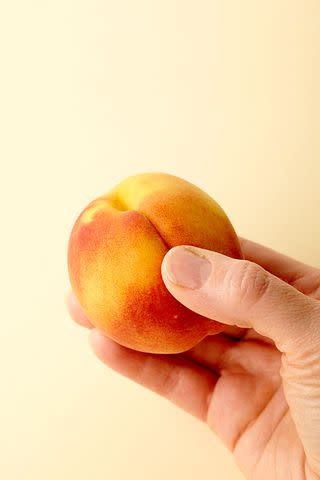
Selecting the Best Fruit for Freezing Peaches
The first step in freezing peaches is to know how to choose the best fruit. When freezing peaches, always choose fruit at its peak of maturity. When ripe, peaches should be intensely fragrant and yield to light pressure at the stem end.
More tips for choosing the best fruit for freezing peaches:
Look for tree-ripened peaches at local farmers markets and farm stands. Commercial peaches are often picked before they're ripe. Ripening them at home might change their texture but won't improve the flavor.
Look for clingstone peaches starting mid-June and freestone peaches from late July through September. Clingstone tends to be juicier and sweeter than freestone. However, as their name suggests, clingstones are more challenging to pit and slice.
Note that for each quart of peaches you're freezing in a water or syrup pack, you'll need 2 to 3 pounds of fruit. You can use any amount that fits in your freezer for flash-freezing peaches.

Try Our Peach Friesling Recipe
Flash Freezing Peaches
This method for freezing peaches is ideal for smoothies and peach ice cream. Flash-freezing peaches means you'll have high-quality frozen peaches for about 2 months versus packing in a water or syrup pack, which lasts 8 to 10 months. But flash freezing is quicker. Here's how to do it.
Wash peaches with cool tap water. Using a sharp knife, cut each peach in half around the pit. Gently twist each half to expose the pit. Using the knife, pry the pit out of the peach. Slice peaches as desired.
Place the peaches on a parchment-lined baking sheet or tray. Make sure the edges of the food don't touch, as this can cause the pieces to fuse as they freeze. Place the baking sheet in the freezer for 2 to 3 hours or until firm.
Label your freezer container with the type of food, the quantity in the container, and the date it was frozen. Remove the tray and transfer the frozen peaches to an airtight container. Freeze for up to 2 months.
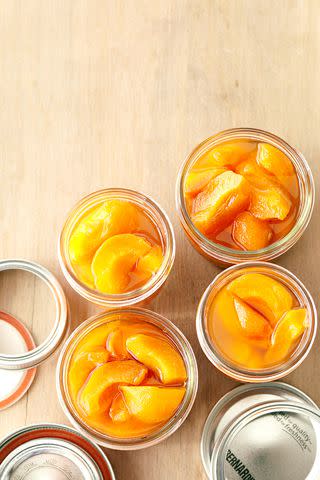
Related: Can You Freeze Pears? You Can, and Here's How to Do It
Choosing the Best Containers for Freezing Peaches in a Water or Syrup Pack
While picking up peaches, bring home the right containers for freezing peaches, too. Use durable, easy-to-seal containers that are moisture- and vapor-resistant and resist cracking at low temperatures. Also, be sure to choose the right size container for your volume of food; wasted space can lead to oxidation and freezer burn.
Here are our recommended vessels for freezing fresh peaches:
Plastic Containers: Use rigid plastic containers with airtight lids designed for freezing.
Canning Jars: Select canning jars approved for freezing; this information is noted on jar packaging. Use only wide-mouth glass jars; jars with necks can crack more easily as contents expand. Don't fill jars above the 1-inch line to allow for food expansion.
Plastic Freezer Bags: Use bags designated for freezing, such as resealable and vacuum freezer bags. These are made of thicker material than regular plastic bags and are more moisture and oxygen-resistant. Remove as much air as possible from the bags.
Related: How to Freeze Strawberries for Fresh Summer Flavor All Year Long
Prepping Peaches for Freezing in a Water or Syrup Pack
Before freezing peaches, you need to blanch and peel them. This step inactivates or slows enzymes that cause loss of flavor and color in your peaches.
Test Kitchen Tip
If you're using a syrup pack for freezing fresh peaches, make the syrup before you prepare your peaches, as it needs to chill before use. See "Packing Peaches for Freezing," below.
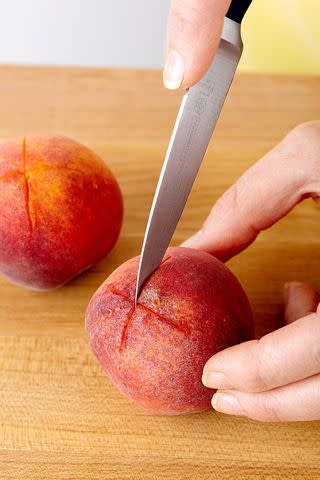
Step 1: Slit the Skin on Each Peach
First, wash the peaches with cool tap water, but don't soak them; drain. Then, use a sharp knife to make a shallow X on the bottom of each peach. This step allows for expansion when the peaches get blanched.
Related: The 11 Best Chef’s Knives of 2023
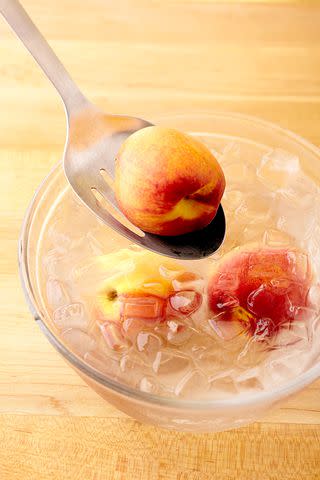
Step 2: Blanch Peaches for Freezing
Blanching (plunging fruit or vegetables into boiling water and then ice water to stop the cooking) firms the flesh, heightens flavor, and loosens the skin to ease peeling.
Bring a large pot of water to a boil.
Fill a large bowl with ice water.
Carefully lower three or four peaches into the boiling water. Remove after 30 to 60 seconds.
Transfer peaches from boiling water to the bowl of ice water using a slotted spoon.
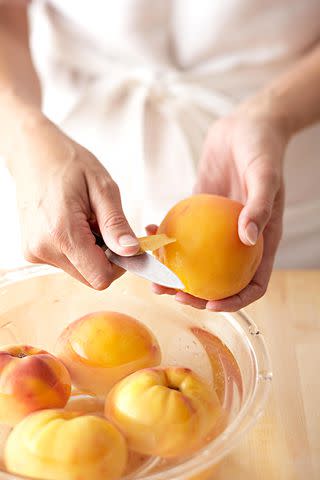
Step 3: Peel the Peaches
When the peaches are cool enough to handle, use a knife or your fingers to peel the skin from each peach.
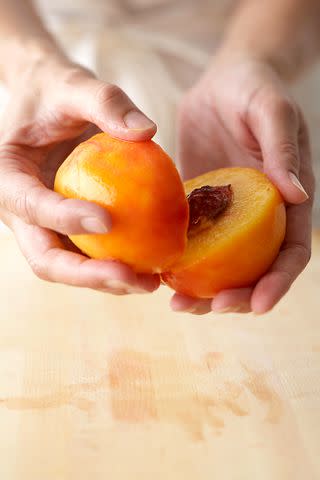
Step 4: Remove Peach Pits
To get that pesky pit out of the way, here's what to do.
Using a sharp knife, cut each peeled peach in half around the pit.
Gently twist each half to expose the pit.
Using the knife, pry the pit out of the peach.
Leave peaches halved, or slice if you desire.
Test Kitchen Tip
Wondering about freezing peaches whole? For optimal flavor and texture, the best way to freeze peaches is halved or sliced, treated with a color-keeper solution, and packed in one of the ways below. Freezing whole fruits works best with smaller fruits, such as berries.
Step 5: Treat Peaches with a Color-Keeper Solution
To preserve the color of the peaches, treat them with an ascorbic-acid color-keeper. The main ingredient in this commercial product is vitamin C, which prevents fruits, like apple and peach slices, from oxidizing and turning brown during freezing and canning. Follow package directions for use.
Related: How to Freeze Bananas Using Our Test Kitchen's Go-To Methods
Packing Peaches for Freezing in a Water or Syrup Pack
Peaches are usually frozen with added sugar or liquid for better flavor (unless you're looking to flash-freeze peaches). Here are your options and the packing instructions for each.
Freezing Peaches in a Water Pack
Here's how to freeze peaches without sugar: Spoon peaches into a pint- or quart-size freezer container (do not use glass jars), leaving ½-inch headspace for pints and 1-inch headspace for quarts. Pour water over the peaches, maintaining the specified headspace.
Freezing Peaches in a Sugar Pack
Spoon a short layer of peaches into a pint- or quart-size freezer container. Sprinkle lightly with sugar; repeat layering, leaving ½ inch headspace for pints and 1-inch headspace for quarts. Cover and let stand 15 minutes or until juicy before freezing.
Freezing Peaches in a Syrup Pack
With this method, you cover the fruit with a syrup made from boiling water and sugar. Generally, heavier syrups (which are sweeter) are used with sour fruits, while lighter syrups are recommended for mild fruits.
To make the syrup, place the following specified amounts of sugar and water in a large saucepan.
Very Thin Syrup: Use 1 cup sugar and 4 cups water to yield about 4 cups syrup.
Thin Syrup: Use 1⅔ cups sugar and 4 cups water to yield about 4¼ cups syrup.
Medium Syrup: Use 2⅔ cups sugar and 4 cups water to yield about 4⅔ cups syrup.
Heavy Syrup: Use 4 cups sugar and 4 cups water to yield about 5¾ cups syrup.
Heat and stir the sugar and water until the sugar dissolves. Remove from heat and skim off foam, if necessary. (Note: Allow ½ to ⅔ cup syrup for every 2 cups of peaches.) Chill the syrup.
Spoon peaches into pint-size or quart-size freezer containers leaving ½-inch headspace for pints and 1-inch headspace for quarts. Pour chilled syrup over the peaches, maintaining the specified headspace.
Related: Our Step-By-Step Guide to Freezing Apples Will Keep Fruit Fresh
Freezing Peach Packs
Here's how to freeze peaches once you've packed them using one of the methods above:
Wipe container rims (if using jars or plastic containers). Seal bags or containers according to the manufacturer's directions, pressing out as much air as possible. Use freezer tape around the lid edges for a tight seal if necessary.
Label each container or bag with its contents, amount, and date. Lay bags flat; add packages to the freezer in batches to ensure food freezes quickly. Leave space between packages so air can circulate around them. Then, when frozen solid, the packages can be placed closer together.
Use frozen peaches within 8 to 10 months.
Test Kitchen Tip
How to thaw frozen peaches: Thaw in their container, in the refrigerator or a bowl of cool water. If you're using a recipe that calls for frozen peaches, generally, you'll need to drain them before using them in the recipe.
Now that you know about freezing peaches, you'll find many ways to enjoy them. You can serve them in a bowl with a bit of cream poured over them for a sweet and simple dessert. Frozen and thawed peaches are also wonderful served over ice cream. Add homemade raspberry sauce and some whipped cream, and you'll transform your peach sundae into a classic French dessert called Peach Melba (or try a Peach Melba smoothie). We're pretty sure you'll run out of your frozen peaches long before you run out of ways to enjoy them!
Related: 21 Healthy Ice Cream and Frozen Dessert Recipes to Beat the Heat
Freeze Vegetables for Cooking Meals
Keep your freezer stocked with nutritious, fresh vegetables frozen for meal prep any time of the year. Keep green beans frozen to use in many recipes, including Blistered Green Beans and Bacon. Summer gardens often produce loads of zucchini, so cut and store them for winter casseroles or soups. Likewise, tomato plants (actually fruit) can provide more than you'll ever use in one summer, so freeze them for big batches of Fresh Tomato Spaghetti Sauce you can make until they grow again next year. Find all you need to know about freezing vegetables in our complete guide.
For more Better Homes & Gardens news, make sure to sign up for our newsletter!
Read the original article on Better Homes & Gardens.
